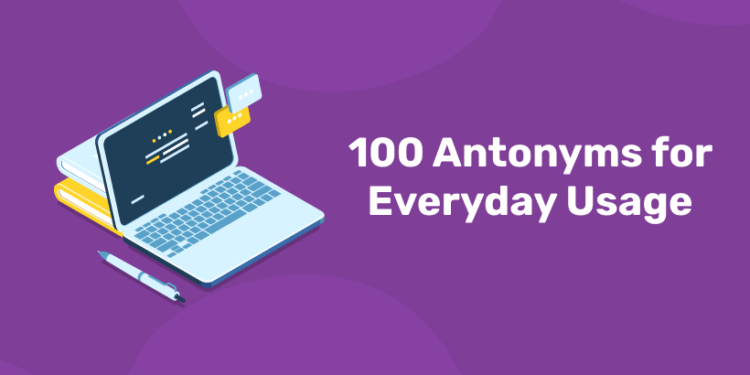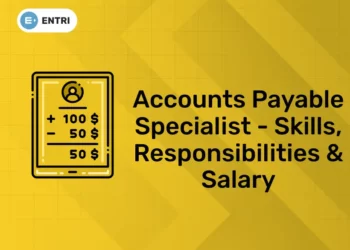Table of Contents
Words are the fundamental components of every language. We use many words for daily conversation and communication processes. Synonyms and antonyms have a great role in that communication process. In this article, we will discuss the antonyms we used in everyday life. Before moving into the list of synonyms, it is important to know what a synonym means and its importance in language.
Antonym – An Overview
An antonym is a term that represents the opposite of another word. For example, the antonym of ‘hot’ maybe ‘cold.’ The root words for the word ‘antonym’ are the words ‘anti,’ indicating ‘against’ or ‘opposite,’ and ‘eponym,’ indicating ‘name.’
To better learn about antonyms, let’s look at what the word ‘synonym’ implies. A synonym is a word that has a similar meaning to or the same meaning as another word. Synonyms and antonyms are exactly the opposite ones.
Want to Know More About Synonyms? Sign Up for ENTRI Learning App!
The Importance of Antonyms
To better know the meaning of a word, we can take a look at its antonym, or opposite meaning. For example, take the word ‘morose.’ The meaning of ‘morose’ is ‘gloomily or sullenly ill-humored.’ Sometimes, even reading a dictionary definition is not enough to give us a whole understanding of a word. Most dictionaries furnish synonyms and antonyms, as well.
For example, here are a few listed synonyms for the word ‘morose:’ ‘moody,’ ‘sour,’ ‘sulky.’ Also, here are a few antonyms: ‘cheerful’ and ‘optimistic.’ Now we understand that the opposite of ‘morose’ is cheerful and even optimistic! Taking a look at both the synonyms and antonyms supplies us with a more precise definition.
100 Antonyms for Everyday Vocabulary
Here, we mentioned 100 common antonyms that can be an amazing tool to improve your vocabulary and encourage meaningful conversations in English.
- Artificial – Natural
- Arrive – Depart
- Argue – Agree
- All – None
- Amateur – Professional
- Alive – Dead
- Advanced – Elementary
- Adult–Child
- Ancestor – Descendant
- Angel – Devil
- Boy – Girl
- Build – Destroy
- Buy – Sell
- Borrow – Lend
- Body – Soul
- Blunt – Sharp
- Bitter – Sweet
- Bottom – Top
- Boring – Exciting
- Busy – Lazy
- Ceiling – Floor
- Catch – Miss
- Careful – Careless
- Calm – Excited
- Close – Open
- Cold – Hot
- Clear – Cloudy
- Child – Adult
- Certainly – Probably
- Callous – Sensitive
- Die – Live
- Dictatorship – Republic
- Dainty – Clumsy
- Desperate – Hopeful
- Divide – Unite
- Domestic – Foreign
- Distant – Near
- Different – Alike
- Drama – Comedy
- Dull – Interesting
- Emigration – Immigration
- Empty – Full
- Eager – Apathetic
- Everything – Nothing
- Evening – Morning
- Even – Odd
- Exclude – Include
- Expensive – Cheap
- Export-Import
- Exit – Entrance
- Foreground – Background
- For – Against
- Forbid – Allow
- Flippant – Somber
- Flat – Hilly
- Future – Past
- Frequently – Occasionally
- Funny – Serious
- Free- Dependent
- Friend – Enemy
- Gaiety – Misery
- Give–Take
- Guest – Host
- Guilty – Innocent
- Gentle – Violent
- Gentleman – Lady
- General – Particular
- Grown-Up – Child
- Good – Bad
- Giant – Tiny
- Heavy – Light
- Heaven – Hell
- Hopeful – Desperate
- Health – Disease
- Hate – Love
- Harvest – Plant
- Handsome – Ugly
- Happy – Sad
- High – Low
- Here – There
- Intentional – Accidental
- Intelligent – Silly
- Inside – Outside
- Ignore – Notice
- Increase – Reduce
- Interrupt – Continue
- Insult – Compliment
- Ill – Healthy
- Ignore – Notice
- Import – Export
- Loser – Winner
- Lower – Higher
- Marry – Divorce
- Mend – Break
- Midnight – Noon
- Melt–Freeze
- Negative – Affirmative
- Native – Foreigner
- Nasty – Nice
- Narrow – Broad
Sign Up for ENTRI Learning App and Get a List of Synonyms for Everyday Usage!
Types of Antonyms
Since the English language is so complicated, people may disagree about which words truly have opposing meanings. Yet, there are three main kinds of antonyms.
Complementary Antonyms – Examples
Complementary antonyms are the exact opposites that have no middle ground. For example, “off” is always the opposite of “on” — there’s no other option for its antonym.
Examples of complementary antonyms contain:
- off — on
- night — day
- entrance — exit
- exterior — interior
- true — false
- dead — alive
- push-pull
- pass-fail
Relational Antonyms – Examples
Relational antonyms represent opposite words as they relate to each other. One word can’t exist without the other word. For instance, a doctor with no patients can’t be a doctor; a predator with no prey is not a predator.
Other examples of relational antonyms contain:
- above — below
- servant — master
- borrow — lend
- give — receive
- buy — sell
- instructor — pupil
Graded Antonyms – Examples
Graded antonyms are based on levels of comparison, and they can be two words on a scale. Many are relative terms, which can be explained differently by different people. For example, “sad” and “happy” are relative antonyms, because someone can be rather sad or quite happy, or mildly sad and mildly happy.
Examples of graded antonyms contain:
- young — elderly
- hard — easy
- happy — wistful
- wise — foolish
- fat — slim
- warm-cool
- early — late
- fast — slow
- dark — pale
Examples of Antonyms Constructed With Prefixes
Sometimes you don’t require to search for another word altogether. It’s feasible to create an antonym simply by adding a prefix to the word, generally, prefixes that mean “not” or “without.”
Adding Dis-
Some examples of antonyms constructed by adding the prefix dis- (“away from”) are:
- agree — disagree
- appear — disappear
- belief — disbelief
- honest — dishonest
Adding In-
Adding the prefix in-, meaning “not,” can cause the following opposites:
- tolerant — intolerant
- decent — indecent
- discreet — indiscreet
- excusable — inexcusable
Adding Mis-
Using the prefix mis- (meaning “wrong”) makes antonyms such as:
- behave — misbehave
- interpret — misinterpret
- lead — mislead
- trust — mistrust
Adding Un-
Examples of antonyms created by adding the prefix un-, which means “not,” are:
- likely — unlikely
- able — unable
- fortunate — unfortunate
- forgiving — unforgiving
Adding Non-
By adding the prefix non- (“without” or “other than”), you can create these antonyms:
- entity — nonentity
- conformist — nonconformist
- payment — nonpayment
- sense — nonsense
Sign Up for ENTRI Learning App for Register the Best English Speaking Course!
The function of antonyms
- Learning antonyms is an effortless and effective way of improving your vocabulary.
- Identifying words in combination with the other or concerning other groups of words can assist you to derive the right meanings and insights.
- Learning antonyms permits you to select your words properly when conveying a message to your audience.
- Understanding these opposite words will additionally boost the confidence in learning the language.
- Antonym words allow you better define the state of the world around you.
Finally, everyone can understand that antonyms have a major role in language learning. Here are the main aspects related to the study of antonyms. Hope this information furnished here will help everyone to know more about the antonyms. Use the above-listed antonyms for your everyday life. You can access more information regarding synonyms, phrases, words, etc through our learning program “English Padikkyam With Inverted Coconut” guided by the Big Boss Malayalam Season 4 fame Aparna Mulberry in ENTRI Learning App!













